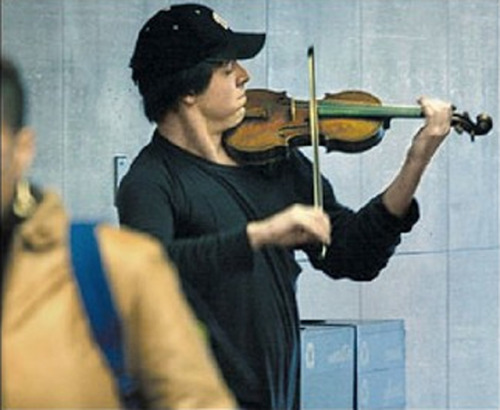Washington, DC Metro Station on a cold January morning in 2007. The man with a violin played six Bach pieces for about 45 minutes. During that time approximately. 2 thousand people went through the station, most of them on their way to work. After 3 minutes a middle aged man noticed there was a musician playing. He slowed his pace and stopped for a few seconds and then hurried to meet his schedule.
4 minutes later:
The violinist received his first dollar: a woman threw the money in the hat and, without stopping, continued to walk.6 minutes:
A young man leaned against the wall to listen to him, then looked at his watch and started to walk again.
10 minutes:
A 3-year old boy stopped but his mother tugged him along hurriedly. The kid stopped to look at the violinist again, but the mother pushed hard and the child continued to walk, turning his head all the time. This action was repeated by several other children. Every parent, without exception, forced their children to move on quickly.
45 minutes:
The musician played continuously. Only 6 people stopped and listened for a short while. About 20 gave money but continued to walk at their normal pace. The man collected a total of $32.
1 hour:
He finished playing and silence took over. No one noticed. No one applauded, nor was there any recognition.
No one knew this, but the violinist was Joshua Bell, one of the greatest musicians in the world. He played one of the most intricate pieces ever written, with a violin worth $3.5 million dollars. Two days before Joshua Bell sold out a theater in Boston where the seats averaged $100.
This is a true story. Joshua Bell playing incognito in the metro station was organized by the Washington Post as part of a social experiment about perception, taste and people’s priorities.
The questions raised:
*In a common place environment at an inappropriate hour, do we perceive beauty?
*Do we stop to appreciate it?
*Do we recognize talent in an unexpected context?
One possible conclusion reached from this experiment could be this:
If we do not have a moment to stop and listen to one of the best musicians in the world, playing some of the finest music ever written, with one of the most beautiful instruments ever made…
How many other things are we missing?
Grandpa Pudding Brains is bored and sleepy
10 hours ago

Wow that's really interesting. I think we've grown into this daily routine, where we focuss on our daily activities and try to block out the world around us. We're just going through the motions.
ReplyDeleteThese people were probably saying, what's up with the violin schtick? Can't he just go with the flow and do a hip-hop dance routine or some Bob Dylan-esque guitar performance and not rub in his music snobbery to the rest of the world? Sheesh.
ReplyDeleteEven me, super-mega-huge music fan, probably would disregard this guy if I passed him by. Even some classical music snob would look at his clothes and ask why the city hasn't done anything about the homeless devaluing the property vales around the area. Anyway.
This kind of reminds me of "A Hard Day's Night", the movie where Ringo decides to walk around in broad daylight, but dresses like a bum. I surely wouldn't appreciate the Beatles as much if they looked like starving musicians.
Also reminds me of that movie "The Soloist." Anyone see it? With Robert Downey Jr. as an LA Times columnist and Jamie Foxx as a homeless, crazy violin prodigy? Very true, and very good. Reminds me, have to look up that very columnist, Steven Lopez.
Nice post, Louise.
Melissa has a good point. We're so set into our daily grind, the thought doesn't even occur to us to diverge from our beaten paths, and take a second to smell the flowers. Or look at a world class violinist, same thing. The fact that several children were the only ones to take any notice of the man support our claim. Children are spontaneous and without routine. Because of this, they have less stress and distraction to occupy them. This enables them to look closer at the world around them, notice new and beautiful things. Furthermore, I don't know of many three year olds walking around with watches on. I think this proves that time and routine are but constraints in life, robbing us of opportunity and beauty.
ReplyDelete